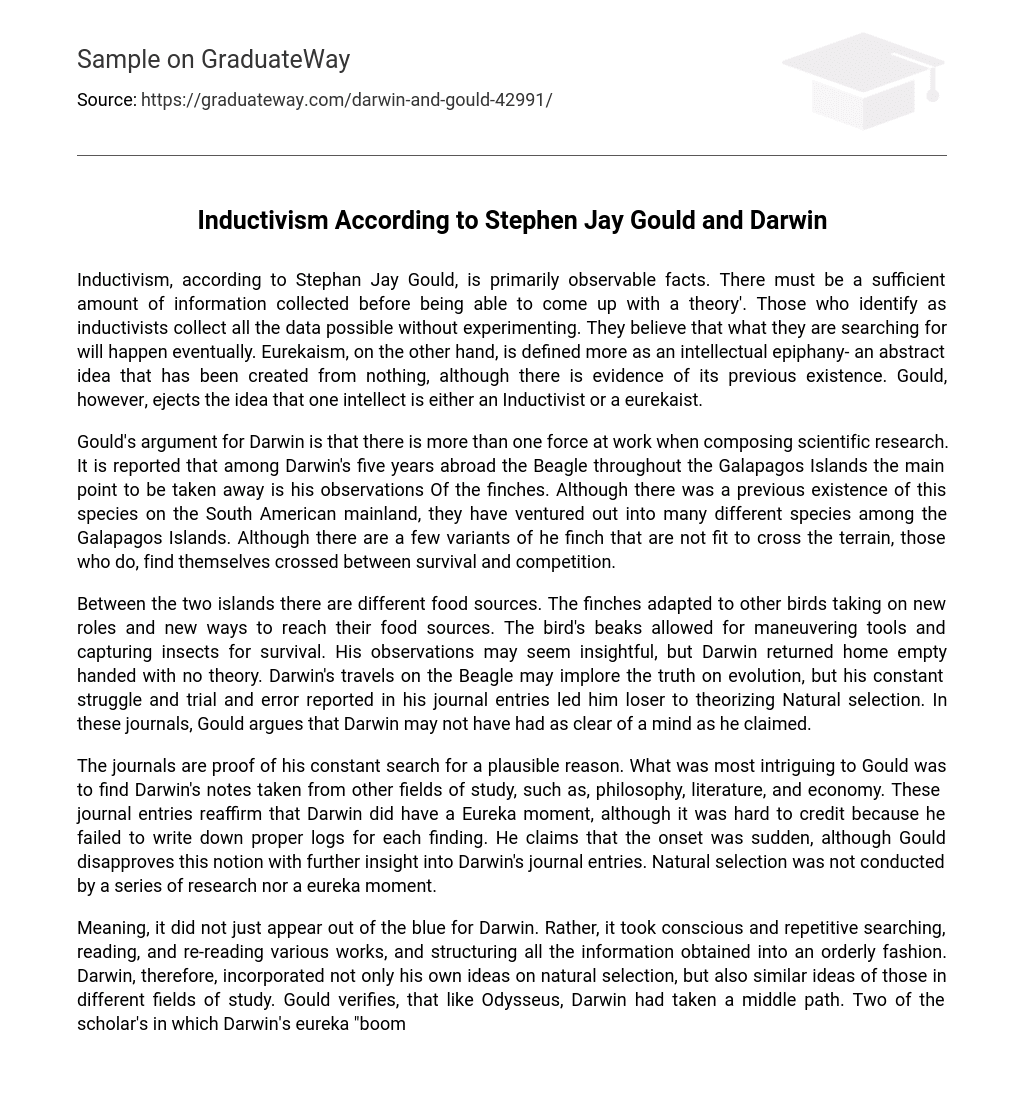Inductivism, according to Stephan Jay Gould, is primarily observable facts. There must be a sufficient amount of information collected before being able to come up with a theory’. Those who identify as inductivists collect all the data possible without experimenting. They believe that what they are searching for will happen eventually. Eurekaism, on the other hand, is defined more as an intellectual epiphany- an abstract idea that has been created from nothing, although there is evidence of its previous existence. Gould, however, ejects the idea that one intellect is either an Inductivist or a eurekaist.
Gould’s argument for Darwin is that there is more than one force at work when composing scientific research. It is reported that among Darwin’s five years abroad the Beagle throughout the Galapagos Islands the main point to be taken away is his observations Of the finches. Although there was a previous existence of this species on the South American mainland, they have ventured out into many different species among the Galapagos Islands. Although there are a few variants of he finch that are not fit to cross the terrain, those who do, find themselves crossed between survival and competition.
Between the two islands there are different food sources. The finches adapted to other birds taking on new roles and new ways to reach their food sources. The bird’s beaks allowed for maneuvering tools and capturing insects for survival. His observations may seem insightful, but Darwin returned home empty handed with no theory. Darwin’s travels on the Beagle may implore the truth on evolution, but his constant struggle and trial and error reported in his journal entries led him loser to theorizing Natural selection. In these journals, Gould argues that Darwin may not have had as clear of a mind as he claimed.
The journals are proof of his constant search for a plausible reason. What was most intriguing to Gould was to find Darwin’s notes taken from other fields of study, such as, philosophy, literature, and economy. These journal entries reaffirm that Darwin did have a Eureka moment, although it was hard to credit because he failed to write down proper logs for each finding. He claims that the onset was sudden, although Gould disapproves this notion with further insight into Darwin’s journal entries. Natural selection was not conducted by a series of research nor a eureka moment.
Meaning, it did not just appear out of the blue for Darwin. Rather, it took conscious and repetitive searching, reading, and re-reading various works, and structuring all the information obtained into an orderly fashion. Darwin, therefore, incorporated not only his own ideas on natural selection, but also similar ideas of those in different fields of study. Gould verifies, that like Odysseus, Darwin had taken a middle path. Two of the scholar’s in which Darwin’s eureka “boom” had been crafted from is Thomas Malthus and Adolphe Quetelet.
Stephan Jay Gould concurs that Darwin was intrigued by Quetelet’s claim that the more the population grew, the greater the shortage of food would be to maintain a stable human existence. Having been familiar with a previous claim by Malthus, Darwin found a familiarity in both. Another acknowledgeable scholar that contributed to Darwin’s success is Adam Smith and his laissez faire economics. Stephan Jay Gould asserts that Darwin’s theory of natural election is a direct representative Of Smith’s economics. This ordered economy is perceived as capitalism as opposed to socialism.
The inhabitants are to compete and struggle for every day necessities as opposed to a socialist’s economy, in which the inhabitants would share. From there, the weak will be separated from the strong and those who are able to supply for themselves will continue to flourish in this economy. Smith had claimed that in order for an economy to be successful, those who struggle day in and day out must obtain balance and order. The success of those people would be passed down to future generations in hopes to carry on the same way.
Stephan Jay Gould corroborates his shock when deciphering the influential absence of Charles Darwin’s own field of study. He claims that the common denominator among all intelligent people is the spark of interest one incurs. It is stated that people are troubled by the idea of science and other fields working together to come up with something greater. Referring back to Gould’s definition’s of Inductivism and Eurekaism, he also states that previous cientist’s had preceded Darwin in the search of evolution.
The trial and errors of those before him set Darwin up to conduct a testable theory. Gould relates this to eurekaism; Darwin’s idea was essentially composed by nothing although previous information existed. Stephan Jay Gould categorizes Charles Darwin as one who used both inductivism and eurekaism in his years of research. Although it may be viewed as pure luck that Darwin happened to have been a part of the Beagle, alive in the time period in which he was brought up, and had come across ther scholars, it is these reasons in which he is an inductivist.





